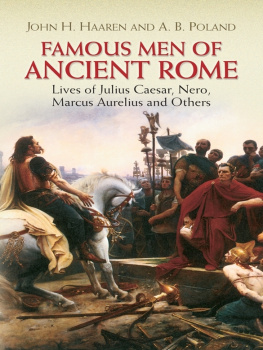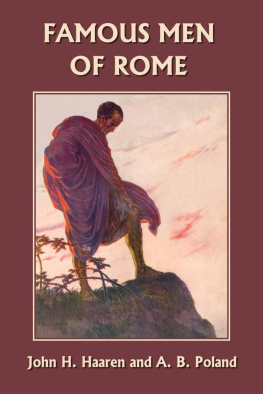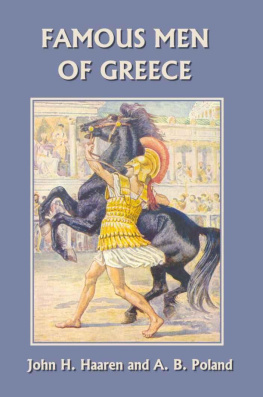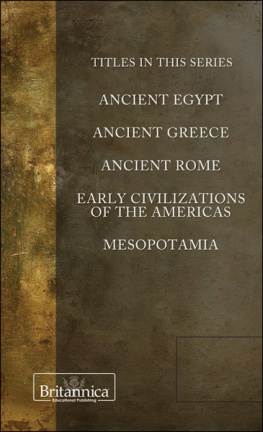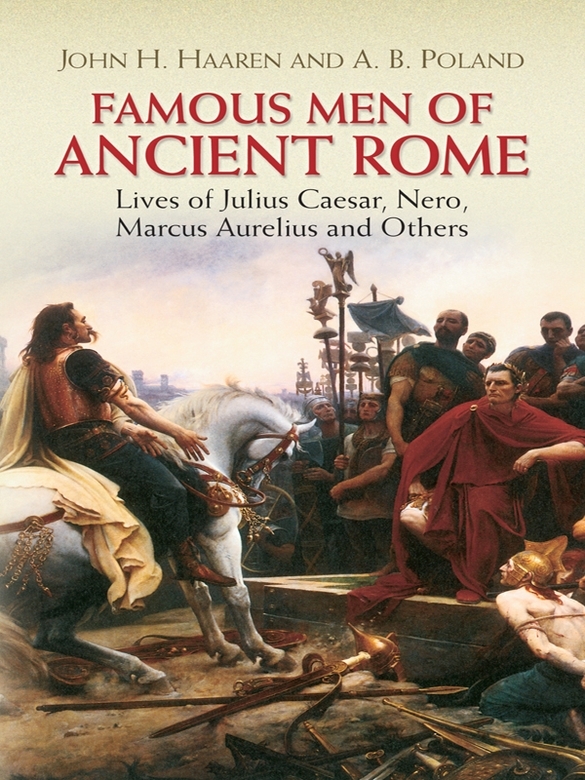M any, many years ago, in the pleasant land of Italy, there was a little city called Alba. It stood on the sunny side of a mountain, near the River Tiber and not far from the Mediterranean Sea. In this city and around the mountain lived a brave, intelligent people known as Latins. Several other tribes inhabited the adjacent mountains and plains.
The Latins were ruled by kings, and one of their kings in very early times was named -neas. He was a famous Trojan chief who had come over the seas to Italy and settled there with his family and friends after Troy was destroyed by the Greeks.
A great many years after the death of neas one of his descendants named Procas was king of Alba. He ruled wisely and well for a long time, and his rather small kingdom on the mountain side, with its wheat-fieIds and vineyards, was very prosperous. He had two sons, one named Numi-tor, and the other A-muli-us. As Numitor was the elder he was heir to his fathers throne, but when King Procas died Amulius seized the kingdom by force and made himself king.
Then Numitor, with his two children, a boy and a girl, left the kings palace at Alba and went to reside on a farm a short distance away.
II
Amulius was now king, but he did not feel quite happy. He was much troubled about Numitors son and daughter. The son, he thought, might some day claim the right to be king as heir of his father, or the daughter might marry and have a son who could become king as grandchild of Numitor.
To prevent either of these things from happening Amulius had Numitors son secretly put to death, and he appointed the daughter Sylvi-a to be a priestess, or an attendant, in the temple of the goddess Vesta. Only young girls were appointed attendants in this temple, and they had to take a vow that they would not marry for thirty years. They were called Vestal Virgins. It was their duty to keep a fire burning continually on the altar of the goddess. This was called the Sacred Fire, and it was believed that if it went out some great disaster would happen to the city.
Amulius now thought there was nothing to hinder him from being king of Alba all his life. But one day the god Mars came down to the city from his palace on a high mountain top and saw Sylvia as she went out of the temple to get water at a well. He fell deeply in love with her. She also fell in love with the god, for he had the appearance of a handsome young man. They were married secretly, and in course of time Sylvia had beautiful twin boys. When Amulius heard of this he gave orders that Sylvia should be put to death for breaking her vow and that the two infants should be thrown into the Tiber. These wicked orders were carried out, for no one dared to disobey the king.
Fortunately, however, the babes had been placed in a stout basket, which floated along the Tiber until it was carried by the waters to the foot of a hill called Pala-tine Hill. Here the huge roots of a wild fig-tree upset the basket, and the little ones were thrown out upon the river bank.
At this moment a great she-wolf came strolling down the hill to drink at the rivers edge. She heard the feeble cries of the infants and went to the place where they lay helpless on the wet sands. She touched them gently with her rough paws, turned them over and licked their faces and plump bodies. Perhaps she thought they were some of her own cubs. At any rate, she carried the babes up the hill to her cave under a large rock. There she fed them as she fed her own cubs and seemed pleased to have them near her. It is said that a woodpecker flew in and out of the cave many times a day, bringing berries for the boys to eat.
One morning as Faustu-lus, the herdsman of King Amulius, was going over Palatine Hill looking for cattle that had gone astray he saw the boys playing with the wolf at the mouth of her cave. He frightened the wolf away and took the boys to his home. His wife pitied the little foundlings and cared for them as though they were her own children.
The herdsman named them Romu-lus and Remus. They grew up to be strong, handsome youths, brave and kind. Until they were twenty years old they lived with the herdsman and helped him in his work, and roamed over the hills light-hearted and free.
During all these years Numitor lived on his farm, and his brother Amulius remained king of Alba. Numitor did not know that his two grandsons had been saved from a watery grave and were liviing so near to him.
But one day Remus had a quarrel with some of the herdsmen of Numitor and they took him prisoner. They then brought him before Numitor, who was much impressed with the noble appearance of the youth and asked him who he was.
Remus told all he knew about himself and Romulus; how they had been found at the cave of the she-wolf and had been reared by the kings herdsman. Just then Faustulus and Romulus came searching for Remus, and were full of joy when they found that no harm had come to him. Numitor questioned the herdsman about the finding of the twins, and after hearing his story was convinced that Romulus and Remus were Sylvias boys, who had been strangely saved from the wrath of their cruel uncle. He was very happy at finding his grandsons and he thanked the herdsman for his good care of them.
Romulus and Remus were also very happy at finding a grandfather and at the sudden change of their fortune. When they were told about Amulius and his wicked deeds, they resolved to punish him for the murder of their mother. So with a few followers they rushed to the palace at Alba and entered the kings chamber.
Behold! we are Sylvias sons whom you thought you had killed, they shouted to Amulius, as he started up in alarm at their entrance. You killed our mother and you shall die for it.
Before he could utter a word they sprang on him with drawn swords and cut his head off. Then they brought Numitor to the palace, and the people welcomed him as the rightful king of Alba.
III
After a little time the two brothers thought they would build a city on Palatine Hill, where the she-wolf had nursed them. So they went to the hill and selected a site. Then they began to talk of a name for their city.
I will be king and give the new city my name, said Romulus.
No, cried Remus. I will be the king and name the city after myself. I have just as much right as you have.
So the brothers argued for a while, but at last they agreed to settle the matter in this way:
At midnight Romulus was to stand on Palatine Hill, and Remus was to stand on another hill a short distance off. Then they were to ask the gods to show them a sign of favor in the sky, and the first who should see anything very remarkable was to name the new city and be its king.
So they went to watch, but nothing appeared until sunrise of the second day, when Remus saw six great vultures flying across the sky from north to south. He ran swiftly to Palatine Hill and told Romulus of what he had seen. But just then twelve vultures, one after another, flew high over the head of Romulus in an almost unbroken line and were soon lost to view.
Then Romulus claimed that he had the favor of the gods, as more birds had appeared to him, but Remus claimed that the gods favored him, as the birds had appeared to him first. Romulus asked the opinion of some of his friends, and as they all agreed that he was right in his claim he paid no further attention to Remus, but began to lay out the new city. He gave it the name of Roma, or Rome, after himself. With a plow he marked out the space on Palatine Hill and along the banks of the Tiber, and he built a low wall round about to protect the city from invaders.

